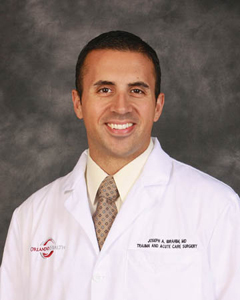Stop the Bleed Initiative: How You Can Help in an Emergency Situation
Trauma is the leading cause of death for people between the ages of 1 to 46.
Between unintentional injuries, homicide and other violent crimes, there may be instances when someone who is bleeding needs immediate care. That’s why two years ago the federal government launched the Stop the Bleed Initiative. Here’s what you should know about this national effort:
What is “Stop the Bleed”?
The White House launched “Stop the Bleed,” a national awareness campaign, in the fall of 2015. The campaign was a direct response to the tragedy at Sandy Hook Elementary School in Newtown, CT in 2012 and is designed to help bystanders become trained and equipped to help someone in a bleeding emergency before EMS or first responders arrive. “Stop the Bleed” mobilizes grassroots efforts and brings together the private sector and nonprofit organizations to train civilians in lifesaving tactics typically used by first responders and the military.
“Stop the Bleed” at Orlando Health
This past February, we started to provide this training locally in the Central Florida area. With the help of Orange County’s Office of the EMS, Orlando Health’s trauma team delivers the medical training component of “Stop the Bleed.” Orlando Health and coordinates the training for individuals, organizations and local businesses.
During the one to two-hour training course, participants learn the basics of bleeding control, including how to apply pressure to the wound or injury site and how to use a tourniquet. They also learn the fundamentals of responding for bleeding — or what we call the ABCs. A stands for Alert (call 9-1-1); B is for Bleeding (find the bleeding injury) and C is for Compress (apply pressure or a tourniquet).
Participants also have access to a bleeding control kit during training, which includes gloves, tourniquets, a gauze coated with special medication to help with blood clotting, a pressure bandage or a compression application. Some municipalities throughout the state also have begun supplying these kits and automatic defibrillator boxes in various public places.
Dr. Michael Chatham, chief surgical quality officer and trauma surgeon at Orlando Regional Medical Center, organized Orlando Health’s local efforts. He said in an interview last fall that the initiative will empower regular people to save a life in an emergency situation.
"You can literally go grab a kit or use the shirt off your back or whatever you have available to hold pressure on the wound and stop the bleeding," he told the Orlando Sentinel.
I couldn’t agree more. Initiatives like “Stop the Bleed” can make a huge difference. Every second counts in an emergency situation, and people who are closest in proximity to the injured person are in an optimal position to deliver immediate care in the event of uncontrolled bleeding. The goal of first responders is to arrive on the scene as quickly as possible, but this often can take several minutes.
Hemorrhage is responsible for more than 35 percent of traumatic injury deaths before someone makes it to the hospital, and over 40 percent of deaths within the first 24 hours of a traumatic injury. If we can empower people to stop the bleed, we can save more lives. A person who is bleeding can die from blood loss within five minutes, so in addition to calling 911, take the time to learn the ABCs of responding to uncontrolled bleeding. If you’re ever in this situation, practice safety first and make sure the scene is safe before you assist anyone who is injured. After this, find the source of the bleeding and open or remove the person’s clothing so you can clearly see where blood is coming from. Next, apply compression to the bleeding wound to stop the bleeding.
While this is a skill none of us ever hope to use, remembering these steps and having this knowledge could make all the difference if you’re ever faced with a trauma emergency. Now come take the course and be a hero!
We Build Relationships
We believe that maintaining a healthy lifestyle is the key to living a longer, healthier life. Orlando Health Physicians strive to build a relationship with each patient. Request an appointment with one of our primary care physicians with offices located throughout Central Florida.
Schedule an Appointment







